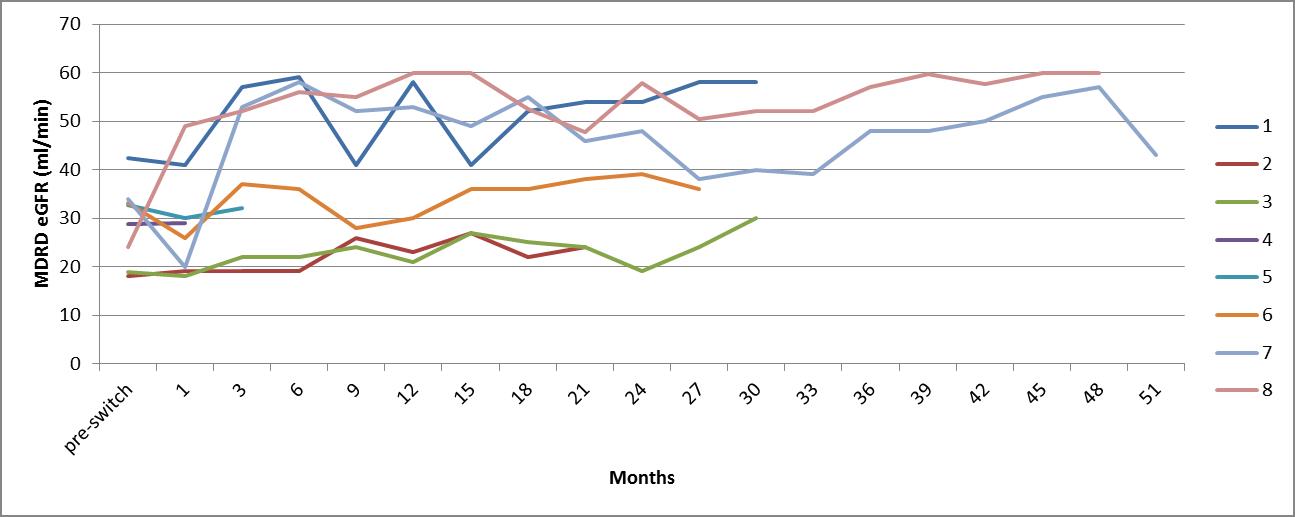Belatacept in Chronic Kidney Disease Stabilizes and Improves Renal Function in Pancreas Transplant Recipients: Intermediate Results.
Indiana University Health, Indianapolis
Meeting: 2017 American Transplant Congress
Abstract number: 415
Keywords: Immunosuppression, Pancreas transplantation, Renal function
Session Information
Session Name: Concurrent Session: Islet (Auto and Allo) and Pancreas Transplantation
Session Type: Concurrent Session
Date: Tuesday, May 2, 2017
Session Time: 2:30pm-4:00pm
 Presentation Time: 3:18pm-3:30pm
Presentation Time: 3:18pm-3:30pm
Location: E353C
Background: We report our experience in converting Pancreas Transplant recipients from tacrolimus to Belatacept in order to avoid further worsening of kidney function.
Results: Eight (7 PTA, 1 SKP, mean age at start of Belatacept= 52.4+/-7, 7 Females 7 Caucasians) patients initially maintained on tacrolimus, sirolimus and mycophenolate with biopsy proven native chronic kidney fibrosis consistent with CNI toxicity were converted from Tacrolimus to Belatacept. Mean tacrolimus levels prior to switch were 6.4+/-1.4 ng/ml.
Median time from transplant to conversion was 4.7 years (range0.3-9.5). Tacrolimus was weaned off over 4-6 weeks. Patients were maintained on a steroid free regimen of Belatacept, Sirolimus (level 3-6ng/ml) and Mycophenolate.
Pre-conversion the mean MDRD eGFR was 29.6+/-9.9., which stabilized or improved over the follow up period to an eGFR of 39+/-13.5 ml/min.  One patient could not tolerate the oral regimen and another patient was non compliant and hence did not complete the study. 1 case experienced elevation of Lipase requiring steroid therapy with subsequent successful response and continued on the same regimen with Belatacept. Subsequently this subject (2) was found to have spindle cell sarcoma at the head of the transplanted pancreas and underwent a total pancreatectomy. Serum glucose, C-peptide and Hemoglobin A1c levels remained unchanged over the study period. There was no incidence of BK, CMV, EBV, PTLD or Donor Specific Antibody (DSA) noted during prospective monitoring of first 12 months. No other new clinically significant event was noted with the use of this regimen over the median follow up of 29.8months (range27-51) with stable renal function and proteinuria.
One patient could not tolerate the oral regimen and another patient was non compliant and hence did not complete the study. 1 case experienced elevation of Lipase requiring steroid therapy with subsequent successful response and continued on the same regimen with Belatacept. Subsequently this subject (2) was found to have spindle cell sarcoma at the head of the transplanted pancreas and underwent a total pancreatectomy. Serum glucose, C-peptide and Hemoglobin A1c levels remained unchanged over the study period. There was no incidence of BK, CMV, EBV, PTLD or Donor Specific Antibody (DSA) noted during prospective monitoring of first 12 months. No other new clinically significant event was noted with the use of this regimen over the median follow up of 29.8months (range27-51) with stable renal function and proteinuria.
Conclusions: Belatacept was able to stabilize and improve renal function in patients with CKD intolerant of tacrolimus without any impact on Pancreas outcomes up to beyond two years. Larger and longer term studies are needed to ensure the safety of this approach in pancreas transplant recipients in order to preserve kidney function.
CITATION INFORMATION: Chen J, Mujtaba M, Taber T, Yaqub M, Powelson J, Adebiyi O, Fridell J, Sharfuddin A. Belatacept in Chronic Kidney Disease Stabilizes and Improves Renal Function in Pancreas Transplant Recipients: Intermediate Results. Am J Transplant. 2017;17 (suppl 3).
To cite this abstract in AMA style:
Chen J, Mujtaba M, Taber T, Yaqub M, Powelson J, Adebiyi O, Fridell J, Sharfuddin A. Belatacept in Chronic Kidney Disease Stabilizes and Improves Renal Function in Pancreas Transplant Recipients: Intermediate Results. [abstract]. Am J Transplant. 2017; 17 (suppl 3). https://atcmeetingabstracts.com/abstract/belatacept-in-chronic-kidney-disease-stabilizes-and-improves-renal-function-in-pancreas-transplant-recipients-intermediate-results/. Accessed February 21, 2026.« Back to 2017 American Transplant Congress
